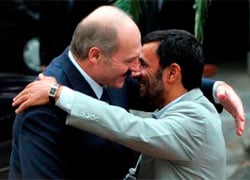Belarus suspected of helping Iran develop nuclear capabilities
36- Reuters
- 15.09.2011, 11:34

If suspicions confirmed, Belarus would join China, Russia, Syria, North Korea, Turkey and other states believed to have helped Tehran flout UN measures since late 2006.
Belarus is the latest country that Western powers suspect of helping Iran skirt UN sanctions aimed at preventing it from expanding its ballistic missile and nuclear programs, Western diplomats told Reuters on Thursday.
If the suspicions are confirmed, the already isolated Belarus would join China, Russia, Syria, North Korea, Turkey and other states Western powers believe have helped Tehran flout UN measures since the Security Council adopted its first sanctions resolution against Iran in late 2006.
The suspicions were expected to be raised during a visit by several members of a UN panel of experts to Belarus this month to discuss compliance with the UN ban on selling Iran nuclear and missile technology, diplomats said.
Tehran, accused by Western powers and their allies of developing a nuclear-weapons capability under the guise of a civilian atomic-energy program, says its nuclear ambitions are limited to the peaceful generation of electricity. Iran also dismisses all sanctions against it as illegal.
Diplomats told Reuters on condition of anonymity that Belarus is beginning to act as a kind of middleman to help secure the Iranians access to Russian technology.
"Belarus is becoming a key element in Iran's efforts to develop its SSM (surface-to-surface missile) and nuclear capabilities, especially with regard to navigation and guidance products, which are defined as dual-use," a diplomat said.
"Belarus is becoming increasingly important to Iran, due to the drastic reduction in Iran's ability to procure products from countries such as China, Russia and Dubai, which used to be its major sources of such procurement," he said.
Several Western diplomats confirmed his remarks about Iran and Belarus, including the Iranians' interest in navigation and guidance technology for their missile program.
Belarus is ‘on our radar’
Belarus itself has been under U.S. and European Union sanctions since President Alexander Lukashenko, in power since 1994, launched a crackdown on protesters in December 2010 following a presidential election that Lukashenko's critics say he rigged.
The country is now in the throes of economic crisis.
One diplomat from a country that has been critical of Iran's nuclear program gave an example of how Belarus has entered into the picture.
He cited intelligence information that a Belarussian businessman named Yuri Charniauski has been trying to secure technology for his company, TM Services, from a Russian firm named Optolink in order to sell it to Iran.
Charniauski, who spoke with Reuters by telephone from Belarus, denied the allegations, saying he had no business dealings with Iran.
"Never," he said, adding that he had neither contacts in nor connections to Iran. "I'm not working for this country ever. ... Optolink has this same information."
Optolink general-director Yuri Korkishko told Reuters that Charniauski's firm was planning to purchase an Inertial Measurement Unit (IMU) from Optolink, which Charniauski said is for Belarus' National Technical University. The deal is TM Services' first transaction with Optolink.
Korkishko said TM Services was now Optolink's official distributor in Belarus. He said he was unaware of any links between Iran and Charniauski or his firm but acknowledged that Iran, like Pakistan, has expressed interest in Optolink's products in the past.
"We do not (work) with Iran at all," he said. "Iran, Pakistan -- I am receiving all sorts of requests from them, but we never reply ... We do not need it."
IMUs are a key navigation and guidance component for guided missiles, as well as aircraft, watercraft and spacecraft.
Diplomats said they were interested in hearing what the authorities in Minsk told representatives of the U.N. Security Council's expert panel this month. The panel members were expected to end their visit this week.
"I think it's good that Belarus knows that it's on our radar," one diplomat said. "Hopefully it will think twice about helping Iran break the law."
Russia's UN mission in New York did not have a comment when contacted by Reuters. Belarus' UN mission did not respond to repeated requests for comment.
As the United Nations, United States and European Union have tightened their sanctions on Iran, its preferred suppliers of nuclear and missile technology in countries like Russia, China and the United Arab Emirates have become increasingly reluctant to do illegal business with Tehran, envoys say.
The diplomats say that as the stranglehold on Iran's nuclear and missile procurement has tightened, so has the monitoring of Iran by Western intelligence agencies, which have become increasingly adept at uncovering illicit attempts by Tehran to import nuclear technology.
"Sanctions are constraining Iran's procurement of items related to prohibited nuclear and ballistic missile activity and thus slowing development of these programs," the Security Council's panel of experts on Iran said in a recent report.
"At the same time, Iran's circumvention of sanctions across all areas, in particular the use of front companies, concealment methods in shipping, financial transactions and the transfer of conventional arms and related material, is willful and continuing," said the confidential report.









